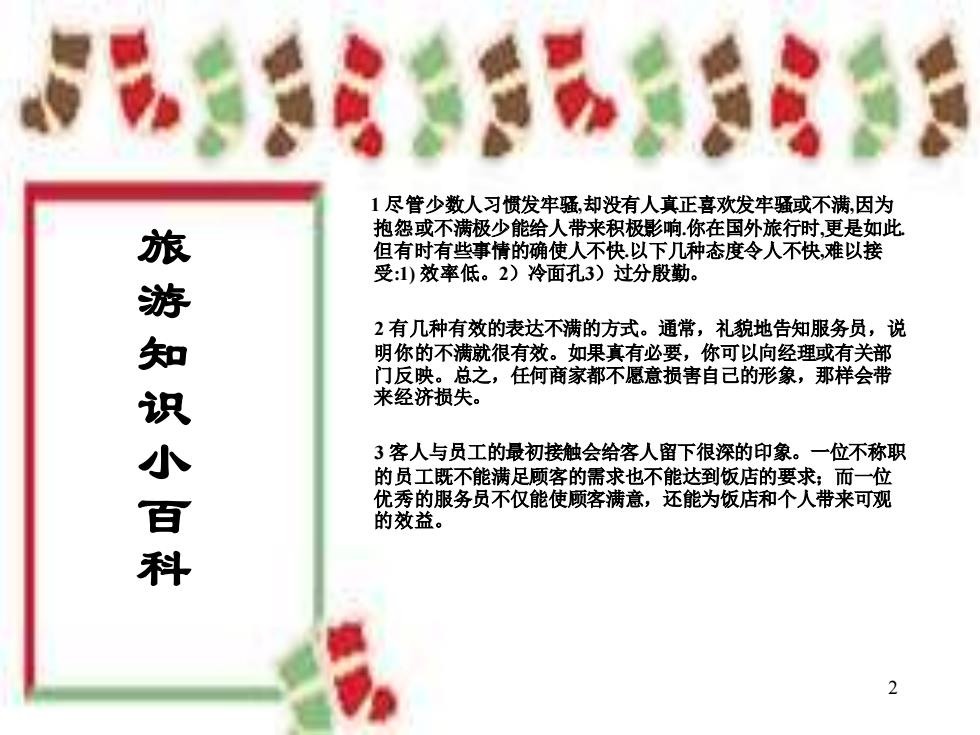
1尽管少数人习惯发牢骚,却没有人真正喜欢发牢骚或不满,因为 抱怨或不满极少能给人带来积极影响你在国外旅行时,更是如此 但有时有些事情的确使人不快以下几种态度令人不快,难以接 旅游知 受:1)效率低。2)冷面孔3)过分殷勤。 2有几种有效的表达不满的方式。通常,礼貌地告知服务员,说 明你的不满就很有效。如果真有必要,你可以向经理或有关部 门反映。总之,任何商家都不愿意损害自已的形象,那样会带 来经济损失。 小百科 3客人与员工的最初接触会给客人留下很深的印象。一位不称职 的员工既不能满足顾客的需求也不能达到饭店的要求;而一位 优秀的服务员不仅能使顾客满意,还能为饭店和个人带来可观 的效益。 2
2 1 尽管少数人习惯发牢骚,却没有人真正喜欢发牢骚或不满,因为 抱怨或不满极少能给人带来积极影响.你在国外旅行时,更是如此. 但有时有些事情的确使人不快.以下几种态度令人不快,难以接 受:1) 效率低。2)冷面孔3)过分殷勤。 2 有几种有效的表达不满的方式。通常,礼貌地告知服务员,说 明你的不满就很有效。如果真有必要,你可以向经理或有关部 门反映。总之,任何商家都不愿意损害自己的形象,那样会带 来经济损失。 3 客人与员工的最初接触会给客人留下很深的印象。一位不称职 的员工既不能满足顾客的需求也不能达到饭店的要求;而一位 优秀的服务员不仅能使顾客满意,还能为饭店和个人带来可观 的效益。 旅 游 知 识 小 百 科
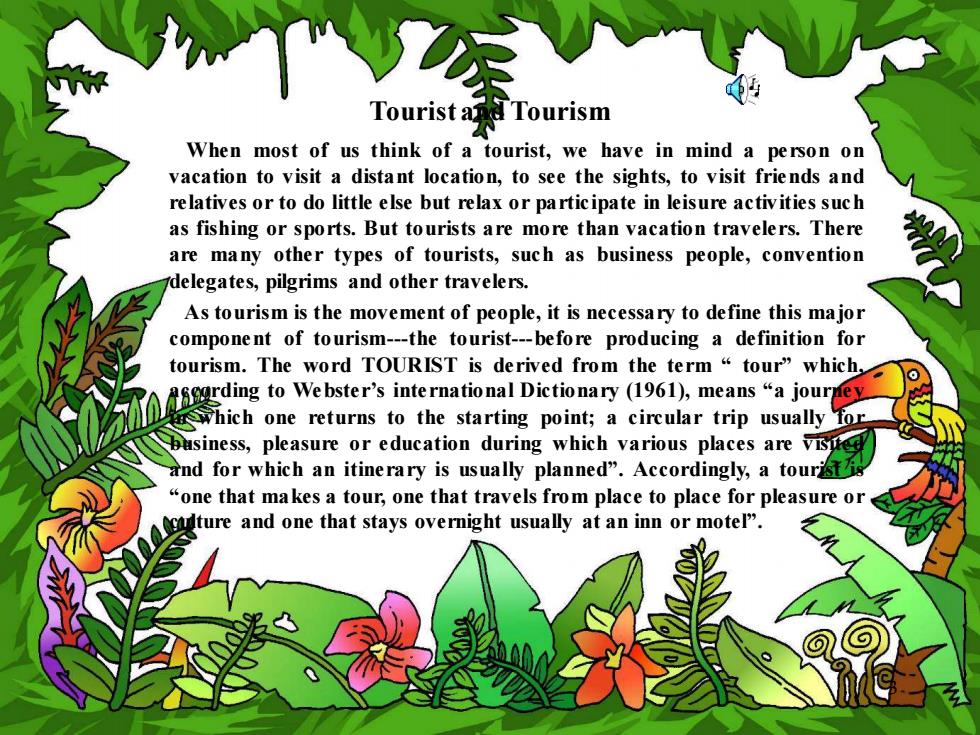
Tourist and Tourism When most of us think of a tourist,we have in mind a person on vacation to visit a distant location,to see the sights,to visit friends and relatives or to do little else but relax or participate in leisure activities such as fishing or sports.But tourists are more than vacation travelers.There are many other types of tourists,such as business people,convention delegates,pilgrims and other travelers. As tourism is the movement of people,it is necessary to define this major component of tourism---the tourist---before producing a definition for tourism.The word TOURIST is derived from the term tour"which, rding to Webster's international Dictionary(1961),means"a jour Which one returns to the starting point;a circular trip usually usiness,pleasure or education during which various places are viste and for which an itinerary is usually planned".Accordingly,a tourisis one that makes a tour,one that travels from place to place for pleasure or ulture and one that stays overnight usually at an inn or motel
3 Tourist and Tourism When most of us think of a tourist, we have in mind a person on vacation to visit a distant location, to see the sights, to visit friends and relatives or to do little else but relax or participate in leisure activities such as fishing or sports. But tourists are more than vacation travelers. There are many other types of tourists, such as business people, convention delegates, pilgrims and other travelers. As tourism is the movement of people, it is necessary to define this major component of tourism---the tourist---before producing a definition for tourism. The word TOURIST is derived from the term “ tour” which, according to Webster’s international Dictionary (1961), means “a journey in which one returns to the starting point; a circular trip usually for business, pleasure or education during which various places are visited and for which an itinerary is usually planned”. Accordingly, a tourist is “one that makes a tour, one that travels from place to place for pleasure or culture and one that stays overnight usually at an inn or motel
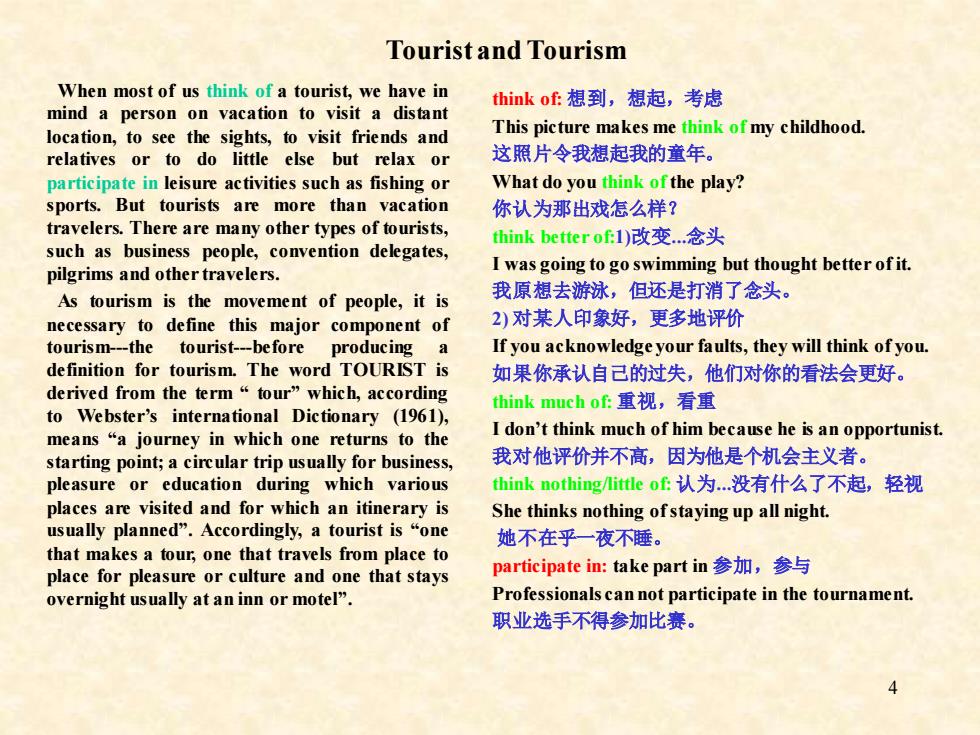
Tourist and Tourism When most of us think of a tourist,we have in think of想到,想起,考虑 mind a person on vacation to visit a distant location,to see the sights,to visit friends and This picture makes me think of my childhood. relatives or to do little else but relax or 这照片令我想起我的童年。 participate in leisure activities such as fishing or What do you think of the play? sports.But tourists are more than vacation 你认为那出戏怎么样? travelers.There are many other types of tourists, think better of:1)改变..念头 such as business people,convention delegates, pilgrims and other travelers. I was going to go swimming but thought better of it. As tourism is the movement of people,it is 我原想去游泳,但还是打消了念头。 necessary to define this major component of 2)对某人印象好,更多地评价 tourism---the tourist---before producing a If you acknowledge your faults,they will think of you. definition for tourism.The word TOURIST is 如果你承认自己的过失,他们对你的看法会更好。 derived from the term "tour"which,according think much of:重视,看重 to Webster's international Dictionary (1961), means "a journey in which one returns to the I don't think much of him because he is an opportunist. starting point;a circular trip usually for business, 我对他评价并不高,因为他是个机会主义者。 pleasure or education during which various think nothing/little of:认为..没有什么了不起,轻视 places are visited and for which an itinerary is She thinks nothing of staying up all night. usually planned".Accordingly,a tourist is "one 她不在乎一夜不睡。 that makes a tour,one that travels from place to place for pleasure or culture and one that stays participate in::take part in参加,参与 overnight usually at an inn or motel". Professionals can not participate in the tournament 职业选手不得参加比赛。 4
4 Tourist and Tourism When most of us think of a tourist, we have in mind a person on vacation to visit a distant location, to see the sights, to visit friends and relatives or to do little else but relax or participate in leisure activities such as fishing or sports. But tourists are more than vacation travelers. There are many other types of tourists, such as business people, convention delegates, pilgrims and other travelers. As tourism is the movement of people, it is necessary to define this major component of tourism---the tourist---before producing a definition for tourism. The word TOURIST is derived from the term “ tour” which, according to Webster’s international Dictionary (1961), means “a journey in which one returns to the starting point; a circular trip usually for business, pleasure or education during which various places are visited and for which an itinerary is usually planned”. Accordingly, a tourist is “one that makes a tour, one that travels from place to place for pleasure or culture and one that stays overnight usually at an inn or motel”. think of: 想到,想起,考虑 This picture makes me think of my childhood. 这照片令我想起我的童年。 What do you think of the play? 你认为那出戏怎么样? think better of:1)改变...念头 I was going to go swimming but thought better of it. 我原想去游泳,但还是打消了念头。 2) 对某人印象好,更多地评价 If you acknowledge your faults, they will think of you. 如果你承认自己的过失,他们对你的看法会更好。 think much of: 重视,看重 I don’t think much of him because he is an opportunist. 我对他评价并不高,因为他是个机会主义者。 think nothing/little of: 认为...没有什么了不起,轻视 She thinks nothing ofstaying up all night. 她不在乎一夜不睡。 participate in: take part in 参加,参与 Professionals cannot participate in the tournament. 职业选手不得参加比赛
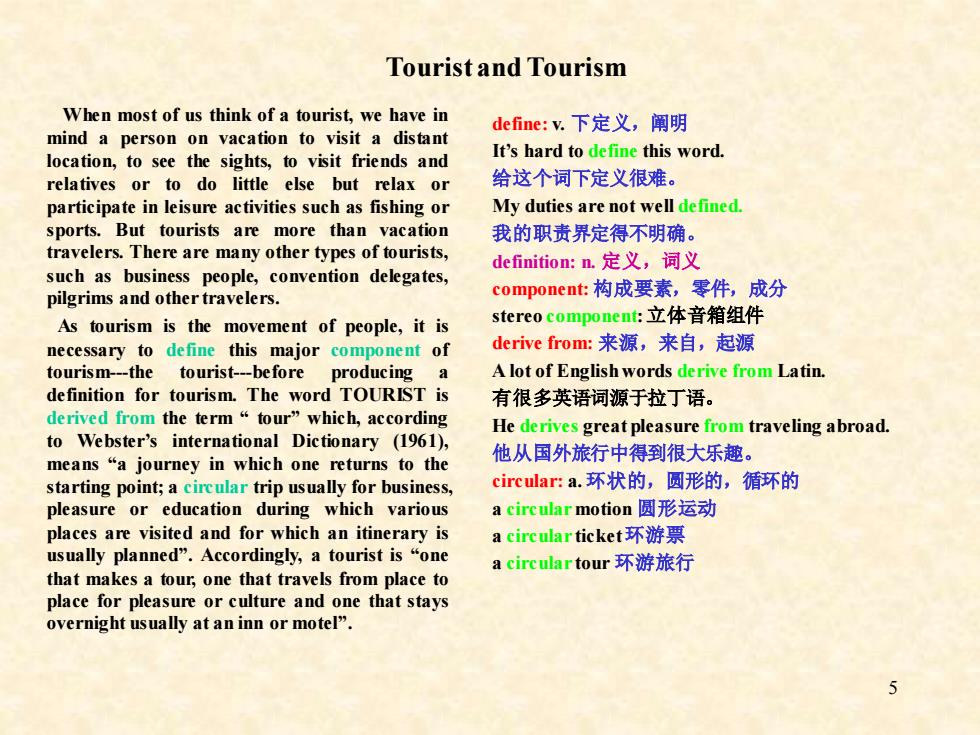
Tourist and Tourism When most of us think of a tourist,we have in define:v.下定义,阐明 mind a person on vacation to visit a distant location,to see the sights,to visit friends and It's hard to define this word. relatives or to do little else but relax or 给这个词下定义很难。 participate in leisure activities such as fishing or My duties are not well defined. sports.But tourists are more than vacation 我的职责界定得不明确。 travelers.There are many other types of tourists, definition::n定义,词义 such as business people,convention delegates, pilgrims and other travelers. component:构成要素,零件,成分 As tourism is the movement of people,it is stereo component:立体音箱组件 necessary to define this major component of derive from:来源,来自,起源 tourism---the tourist---before producing a A lot of English words derive from Latin. definition for tourism.The word TOURIST is 有很多英语词源于拉丁语。 derived from the term“tour”which,according He derives great pleasure from traveling abroad. to Webster's international Dictionary (1961), 他从国外旅行中得到很大乐趣。 means "a journey in which one returns to the starting point;a circular trip usually for business, circular:a.环状的,圆形的,循环的 pleasure or education during which various a circular motion圆形运动 places are visited and for which an itinerary is a circular ticket环游票 usually planned".Accordingly,a tourist is "one a circulartour环游旅行 that makes a tour,one that travels from place to place for pleasure or culture and one that stays overnight usually at an inn or motel". 5
5 Tourist and Tourism When most of us think of a tourist, we have in mind a person on vacation to visit a distant location, to see the sights, to visit friends and relatives or to do little else but relax or participate in leisure activities such as fishing or sports. But tourists are more than vacation travelers. There are many other types of tourists, such as business people, convention delegates, pilgrims and other travelers. As tourism is the movement of people, it is necessary to define this major component of tourism---the tourist---before producing a definition for tourism. The word TOURIST is derived from the term “ tour” which, according to Webster’s international Dictionary (1961), means “a journey in which one returns to the starting point; a circular trip usually for business, pleasure or education during which various places are visited and for which an itinerary is usually planned”. Accordingly, a tourist is “one that makes a tour, one that travels from place to place for pleasure or culture and one that stays overnight usually at an inn or motel”. define: v. 下定义,阐明 It’s hard to define this word. 给这个词下定义很难。 My duties are not well defined. 我的职责界定得不明确。 definition: n. 定义,词义 component: 构成要素,零件,成分 stereo component:立体音箱组件 derive from: 来源,来自,起源 A lot of Englishwords derive from Latin. 有很多英语词源于拉丁语。 He derives great pleasure from traveling abroad. 他从国外旅行中得到很大乐趣。 circular: a. 环状的,圆形的,循环的 a circularmotion 圆形运动 a circular ticket环游票 a circular tour 环游旅行
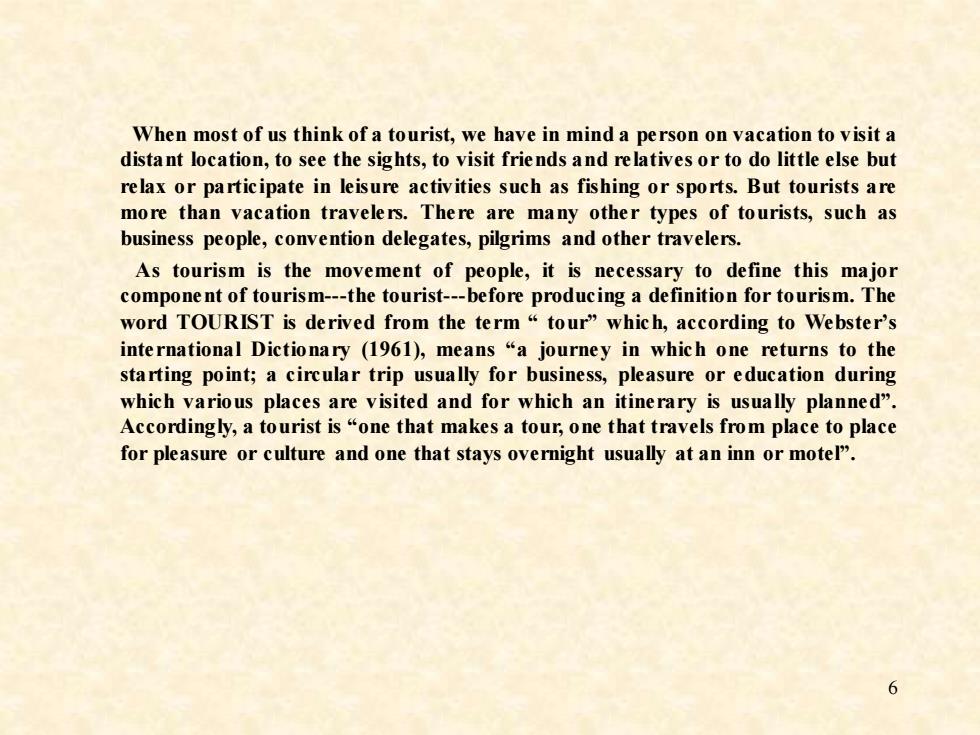
When most of us think of a tourist,we have in mind a person on vacation to visit a distant location,to see the sights,to visit friends and relatives or to do little else but relax or participate in leisure activities such as fishing or sports.But tourists are more than vacation travelers.There are many other types of tourists,such as business people,convention delegates,pilgrims and other travelers. As tourism is the movement of people,it is necessary to define this major component of tourism---the tourist---before producing a definition for tourism.The word TOURIST is derived from the term tour"which,according to Webster's international Dictionary (1961),means "a journey in which one returns to the starting point;a circular trip usually for business,pleasure or education during which various places are visited and for which an itinerary is usually planned". Accordingly,a tourist is "one that makes a tour,one that travels from place to place for pleasure or culture and one that stays overnight usually at an inn or motel". 6
6 When most of us think of a tourist, we have in mind a person on vacation to visit a distant location, to see the sights, to visit friends and relatives or to do little else but relax or participate in leisure activities such as fishing or sports. But tourists are more than vacation travelers. There are many other types of tourists, such as business people, convention delegates, pilgrims and other travelers. As tourism is the movement of people, it is necessary to define this major component of tourism---the tourist---before producing a definition for tourism. The word TOURIST is derived from the term “ tour” which, according to Webster’s international Dictionary (1961), means “a journey in which one returns to the starting point; a circular trip usually for business, pleasure or education during which various places are visited and for which an itinerary is usually planned”. Accordingly, a tourist is “one that makes a tour, one that travels from place to place for pleasure or culture and one that stays overnight usually at an inn or motel

Tourist and Tourism Dictionary meanings of furist have expanded and become complicated with the rise of tourism research.A significant addition to the dictionary meaning was that persons traveling to meetings or on business were included here.Thus a tourist was no longer only a pleasure traveler he might also travel for business,convention or health,etc.. However inclusive as this definition was,it ignored the movement of domestic tourists.In 1963,the United Nations sponsored a Conference on. International Travel and Tourism in Rome,on which definitions of “visitor”and“tourist”were developed for use in compiling international statistics.It defined a visitor as "any person visiting a country other than that in which he has his usual place of residence,for any reason other following an occupation,remunerated from within the Kisited".This definition was to cover two classes of visitors: 1.Tourists,who were classed as temporary visitors staying at leas 2 hours, whose purpose could be classified as leisure (whether for ecreation,health,sport,holiday,study or religion),business, miy ission or meeting; staying than 24 hours,inc luding velers b elers
7 Tourist and Tourism Dictionary meanings of tourist have expanded and become complicated with the rise of tourism research. A significant addition to the dictionary meaning was that persons traveling to meetings or on business were included here. Thus a tourist was no longer only a pleasure traveler, he might also travel for business, convention or health, etc.. However, inclusive as this definition was, it ignored the movement of domestic tourists. In 1963, the United Nations sponsored a Conference on International Travel and Tourism in Rome, on which definitions of “visitor” and “tourist” were developed for use in compiling international statistics. It defined a visitor as “any person visiting a country other than that in which he has his usual place of residence, for any reason other than following an occupation, remunerated from within the country visited”. This definition was to cover two classes of visitors: 1. Tourists, who were classed as temporary visitors staying at least 24 hours, whose purpose could be classified as leisure (whether for recreation, health, sport, holiday, study or religion), business, family, mission or meeting; 2. Excursionists, who were classed as temporary visitors staying less than 24 hours, including cruise travelers but excluding travelers in transit
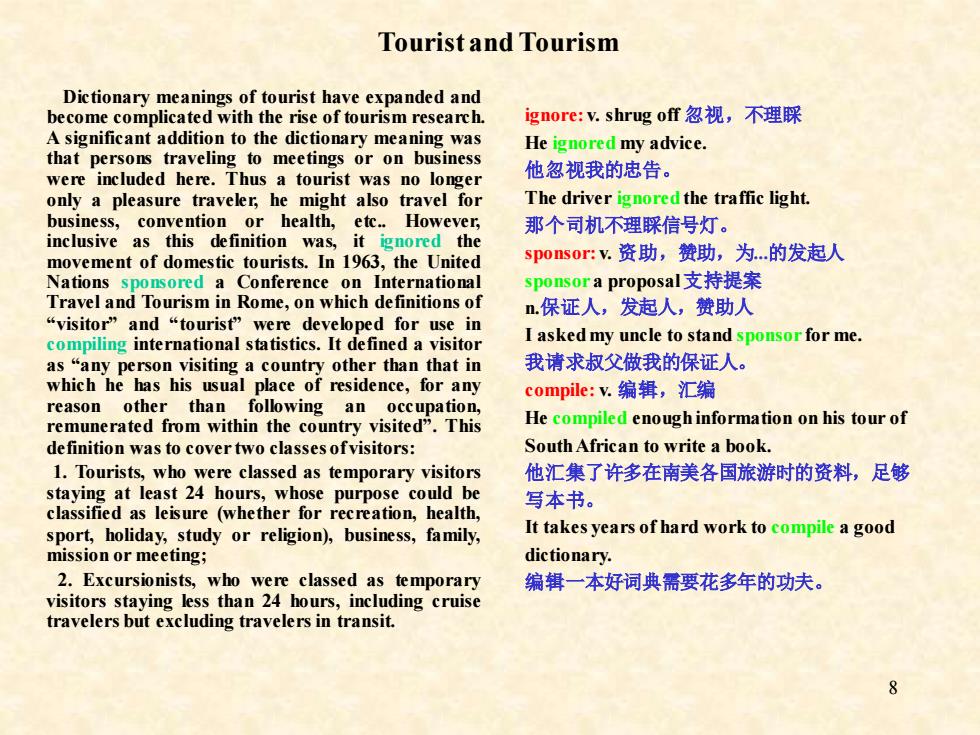
Tourist and Tourism Dictionary meanings of tourist have expanded and become complicated with the rise of tourism research. ignore:V.shrug off忽视,不理睬 A significant addition to the dictionary meaning was He ignored my advice. that persons traveling to meetings or on business were included here.Thus a tourist was no longer 他忽视我的忠告。 only a pleasure traveler,he might also travel for The driver ignored the traffic light. business,convention or health,etc..However, 那个司机不理睬信号灯。 inclusive as this definition was,it ignored the movement of domestic tourists.In 1963,the United sponsor:v资助,赞助,为.的发起人 Nations sponsored a Conference on International sponsora proposal支持提案 Travel and Tourism in Rome,on which definitions of n.保证人,发起人,赞助人 “visitor'”and“tourist”were developed for use in compiling international statistics.It defined a visitor I asked my uncle to stand sponsor for me. as "any person visiting a country other than that in 我请求叔父做我的保证人。 which he has his usual place of residence,for any compile::v编辑,汇编 reason other than following an occupation, remunerated from within the country visited".This He compiled enough information on his tour of definition was to cover two classes ofvisitors: South African to write a book. 1.Tourists,who were classed as temporary visitors 他汇集了许多在南美各国旅游时的资料,足够 staying at least 24 hours,whose purpose could be 写本书。 classified as leisure (whether for recreation,health, sport,holiday,study or religion),business,family, It takes years of hard work to compile a good mission or meeting; dictionary. 2.Excursionists,who were classed as temporary 编辑一本好词典需要花多年的功夫。 visitors staying less than 24 hours,including cruise travelers but excluding travelers in transit. 8
8 Tourist and Tourism Dictionary meanings of tourist have expanded and become complicated with the rise of tourism research. A significant addition to the dictionary meaning was that persons traveling to meetings or on business were included here. Thus a tourist was no longer only a pleasure traveler, he might also travel for business, convention or health, etc.. However, inclusive as this definition was, it ignored the movement of domestic tourists. In 1963, the United Nations sponsored a Conference on International Travel and Tourism in Rome, on which definitions of “visitor” and “tourist” were developed for use in compiling international statistics. It defined a visitor as “any person visiting a country other than that in which he has his usual place of residence, for any reason other than following an occupation, remunerated from within the country visited”. This definition wasto cover two classes of visitors: 1. Tourists, who were classed as temporary visitors staying at least 24 hours, whose purpose could be classified as leisure (whether for recreation, health, sport, holiday, study or religion), business, family, mission or meeting; 2. Excursionists, who were classed as temporary visitors staying less than 24 hours, including cruise travelers but excluding travelers in transit. ignore: v. shrug off 忽视,不理睬 He ignored my advice. 他忽视我的忠告。 The driver ignoredthe traffic light. 那个司机不理睬信号灯。 sponsor: v. 资助,赞助,为...的发起人 sponsor a proposal支持提案 n.保证人,发起人,赞助人 I askedmy uncle to stand sponsor for me. 我请求叔父做我的保证人。 compile: v. 编辑,汇编 He compiled enoughinformation on his tour of SouthAfrican to write a book. 他汇集了许多在南美各国旅游时的资料,足够 写本书。 It takes years of hard work to compile a good dictionary. 编辑一本好词典需要花多年的功夫
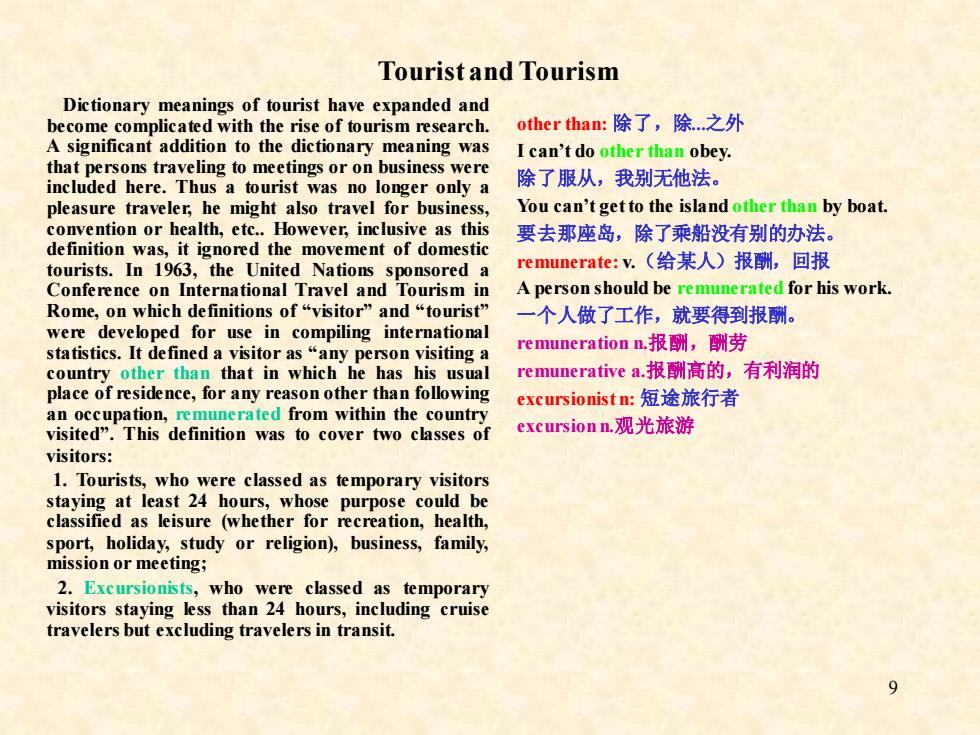
Tourist and Tourism Dictionary meanings of tourist have expanded and become complicated with the rise of tourism research. other than:除了,除之外 A significant addition to the dictionary meaning was I can't do other than obey. that persons traveling to meetings or on business were included here.Thus a tourist was no longer only a 除了服从,我别无他法。 pleasure traveler,he might also travel for business, You can't get to the island other than by boat. convention or health,etc..However,inclusive as this 要去那座岛,除了乘船没有别的办法。 definition was,it ignored the movement of domestic tourists.In 1963,the United Nations sponsored a remunerate:v.(给某人)报酬,回报 Conference on International Travel and Tourism in A person should be remunerated for his work. Rome,on which definitions of“visitor'”and“tourist"” 一个人做了工作,就要得到报酬。 were developed for use in compiling international statistics.It defined a visitor as "any person visiting a remuneration n.报酬,酬劳 country other than that in which he has his usual remunerative a.报酬高的,有利润的 place of residence,for any reason other than following excursionistn:短途旅行者 an occupation,remunerated from within the country visited".This definition was to cover two classes of excursion n.观光旅游 visitors: 1.Tourists,who were classed as temporary visitors staying at least 24 hours,whose purpose could be classified as leisure (whether for recreation,health, sport,holiday,study or religion),business,family, mission or meeting; 2.Excursionists,who were classed as temporary visitors staying less than 24 hours,including cruise travelers but excluding travelers in transit. 9
9 Tourist and Tourism Dictionary meanings of tourist have expanded and become complicated with the rise of tourism research. A significant addition to the dictionary meaning was that persons traveling to meetings or on business were included here. Thus a tourist was no longer only a pleasure traveler, he might also travel for business, convention or health, etc.. However, inclusive as this definition was, it ignored the movement of domestic tourists. In 1963, the United Nations sponsored a Conference on International Travel and Tourism in Rome, on which definitions of “visitor” and “tourist” were developed for use in compiling international statistics. It defined a visitor as “any person visiting a country other than that in which he has his usual place of residence, for any reason other than following an occupation, remunerated from within the country visited”. This definition was to cover two classes of visitors: 1. Tourists, who were classed as temporary visitors staying at least 24 hours, whose purpose could be classified as leisure (whether for recreation, health, sport, holiday, study or religion), business, family, mission or meeting; 2. Excursionists, who were classed as temporary visitors staying less than 24 hours, including cruise travelers but excluding travelers in transit. other than: 除了,除...之外 I can’t do other than obey. 除了服从,我别无他法。 You can’t getto the island other than by boat. 要去那座岛,除了乘船没有别的办法。 remunerate: v.(给某人)报酬,回报 A person should be remunerated for his work. 一个人做了工作,就要得到报酬。 remuneration n.报酬,酬劳 remunerative a.报酬高的,有利润的 excursionist n: 短途旅行者 excursionn.观光旅游
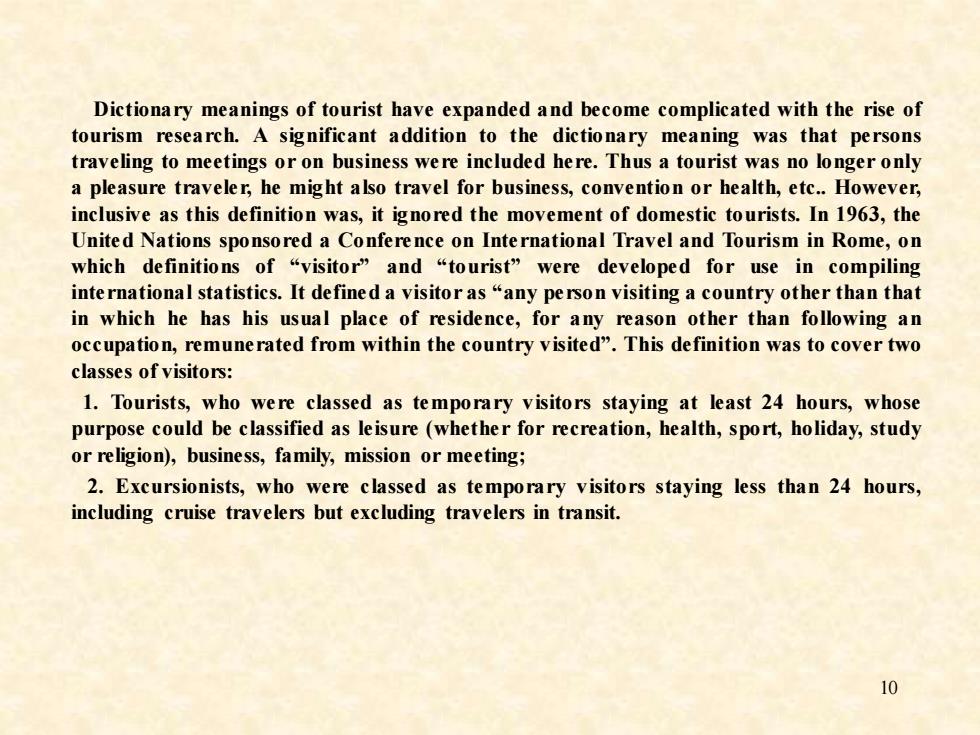
Dictionary meanings of tourist have expanded and become complicated with the rise of tourism research.A significant addition to the dictionary meaning was that persons traveling to meetings or on business were included here.Thus a tourist was no longer only a pleasure traveler,he might also travel for business,convention or health,etc..However, inclusive as this definition was,it ignored the movement of domestic tourists.In 1963,the United Nations sponsored a Conference on International Travel and Tourism in Rome,on which definitions of“visitor'”and“tourist”were developed for use in compiling international statistics.It defined a visitor as "any person visiting a country other than that in which he has his usual place of residence,for any reason other than following an occupation,remunerated from within the country visited".This definition was to cover two classes of visitors: 1.Tourists,who were classed as temporary visitors staying at least 24 hours,whose purpose could be classified as leisure (whether for recreation,health,sport,holiday,study or religion),business,family,mission or meeting; 2.Excursionists,who were classed as temporary visitors staying less than 24 hours, including cruise travelers but excluding travelers in transit. 10
10 Dictionary meanings of tourist have expanded and become complicated with the rise of tourism research. A significant addition to the dictionary meaning was that persons traveling to meetings or on business were included here. Thus a tourist was no longer only a pleasure traveler, he might also travel for business, convention or health, etc.. However, inclusive as this definition was, it ignored the movement of domestic tourists. In 1963, the United Nations sponsored a Conference on International Travel and Tourism in Rome, on which definitions of “visitor” and “tourist” were developed for use in compiling international statistics. It defined a visitor as “any person visiting a country other than that in which he has his usual place of residence, for any reason other than following an occupation, remunerated from within the country visited”. This definition was to cover two classes of visitors: 1. Tourists, who were classed as temporary visitors staying at least 24 hours, whose purpose could be classified as leisure (whether for recreation, health, sport, holiday, study or religion), business, family, mission or meeting; 2. Excursionists, who were classed as temporary visitors staying less than 24 hours, including cruise travelers but excluding travelers in transit
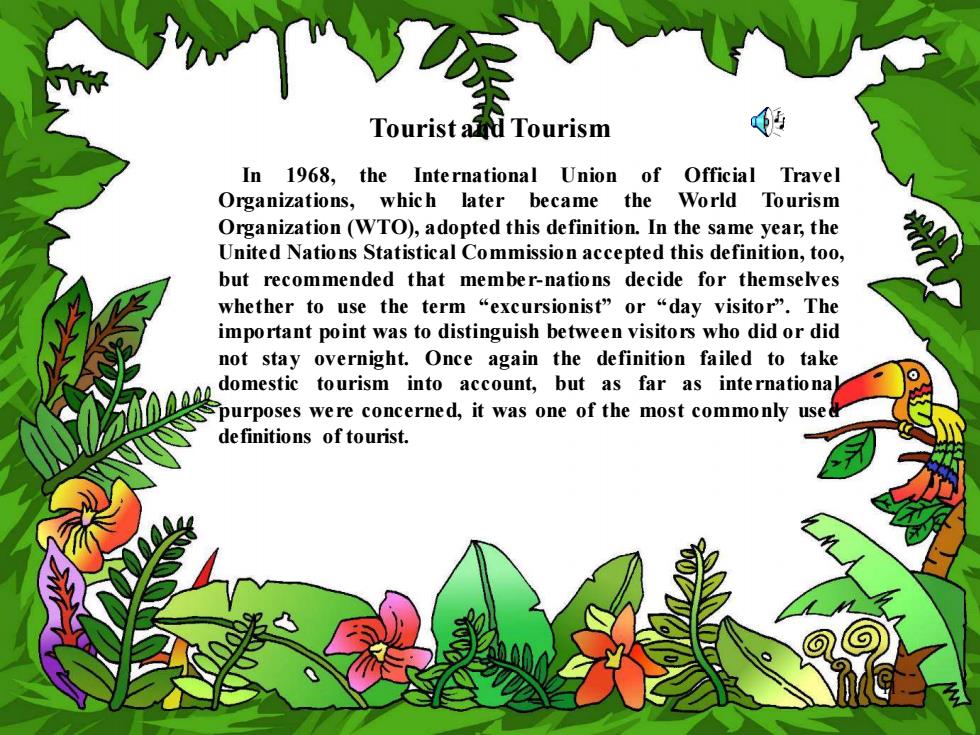
Tourist azd Tourism In 1968,the International Union of Official Travel Organizations,which later became the World Tourism Organization(WTO),adopted this definition.In the same year,the United Nations Statistical Commission accepted this definition,too, but recommended that member-nations decide for themselves whether to use the term“excursionist”or“day visitor'”.The important point was to distinguish between visitors who did or did not stay overnight.Once again the definition failed to take domestic tourism into account,but as far as internationa purposes were concerned,it was one of the most commonly used definitions of tourist
11 Tourist and Tourism In 1968, the International Union of Official Travel Organizations, which later became the World Tourism Organization (WTO), adopted this definition. In the same year, the United Nations Statistical Commission accepted this definition, too, but recommended that member-nations decide for themselves whether to use the term “excursionist” or “day visitor”. The important point was to distinguish between visitors who did or did not stay overnight. Once again the definition failed to take domestic tourism into account, but as far as international purposes were concerned, it was one of the most commonly used definitions of tourist